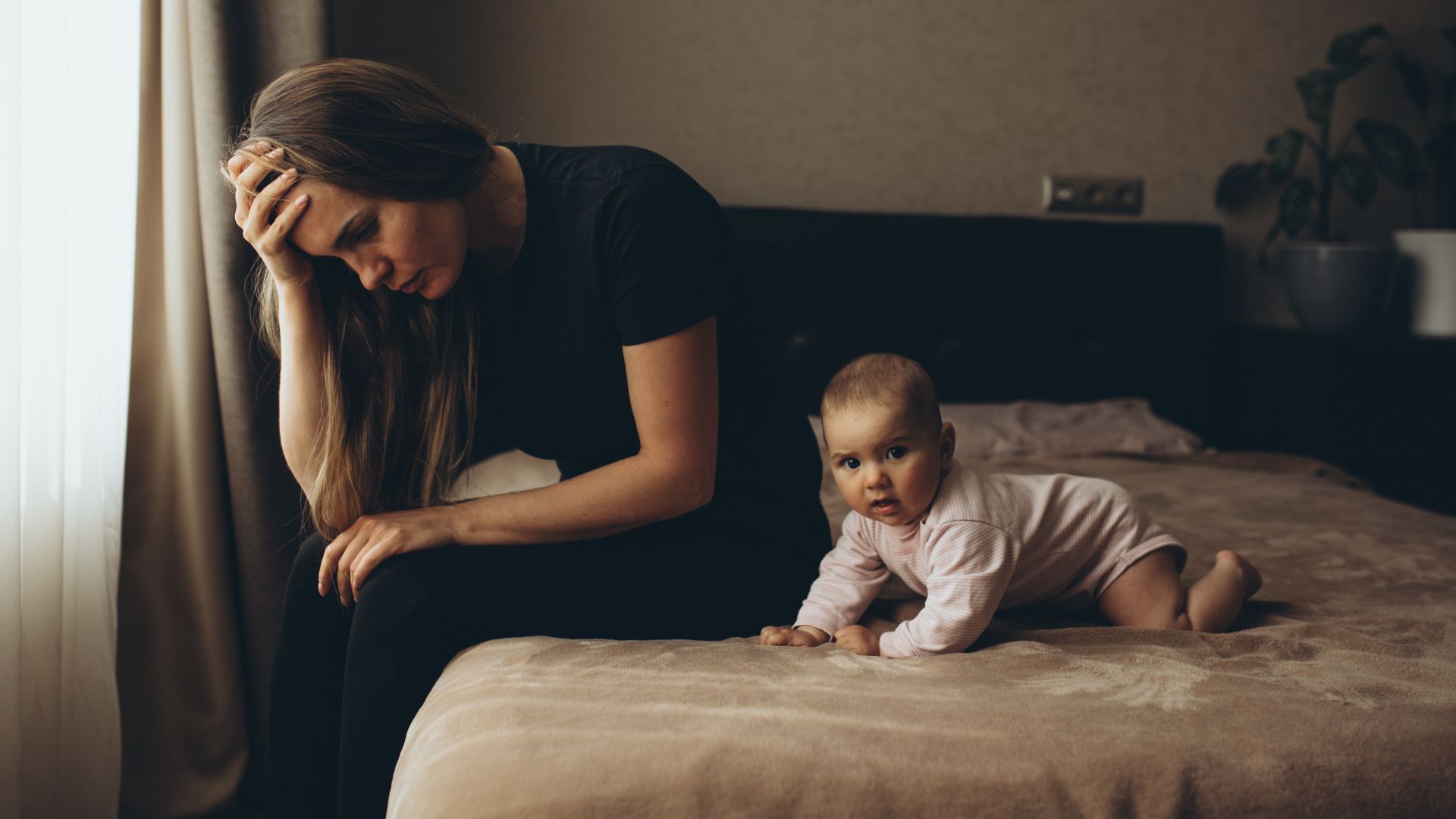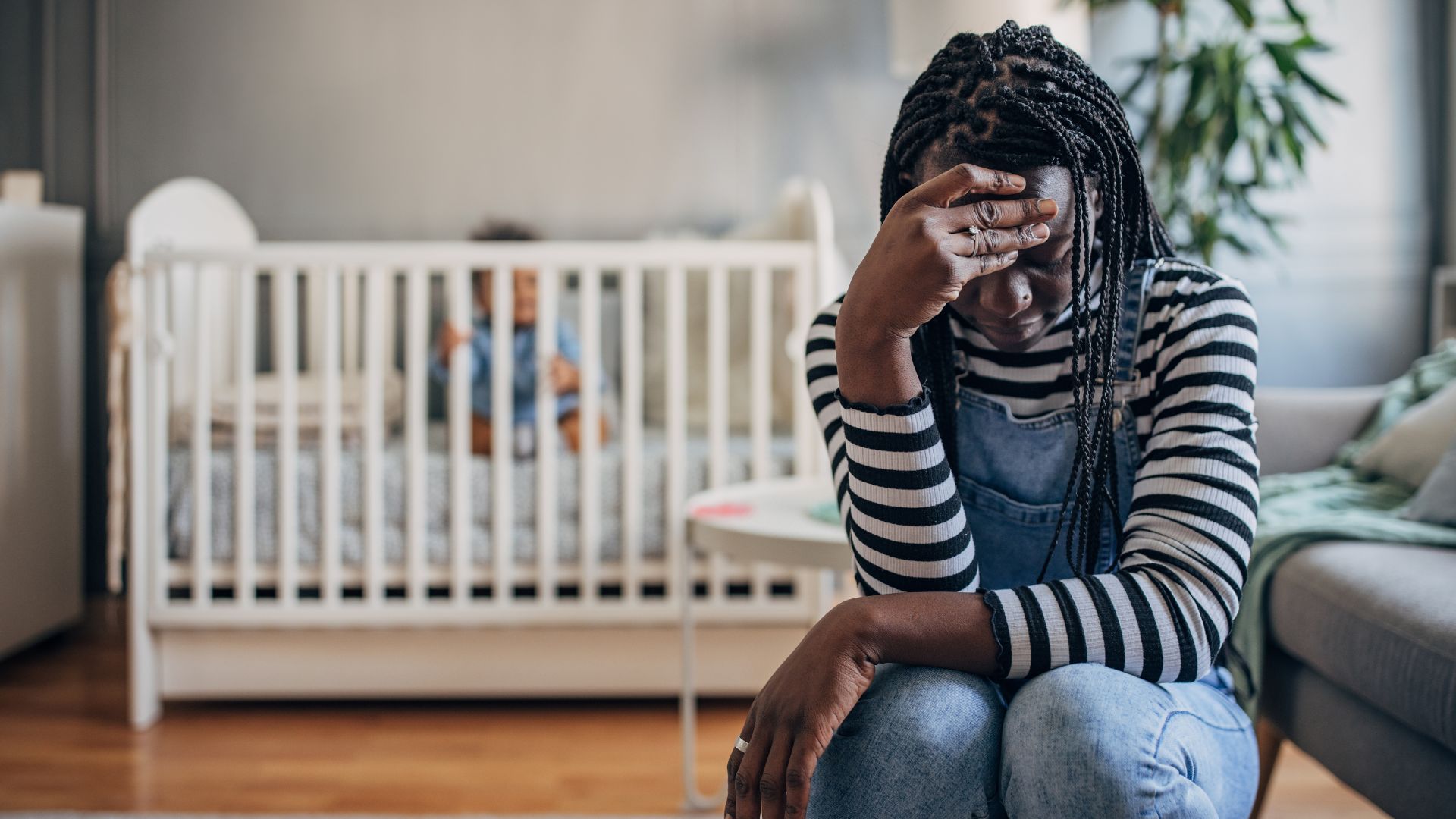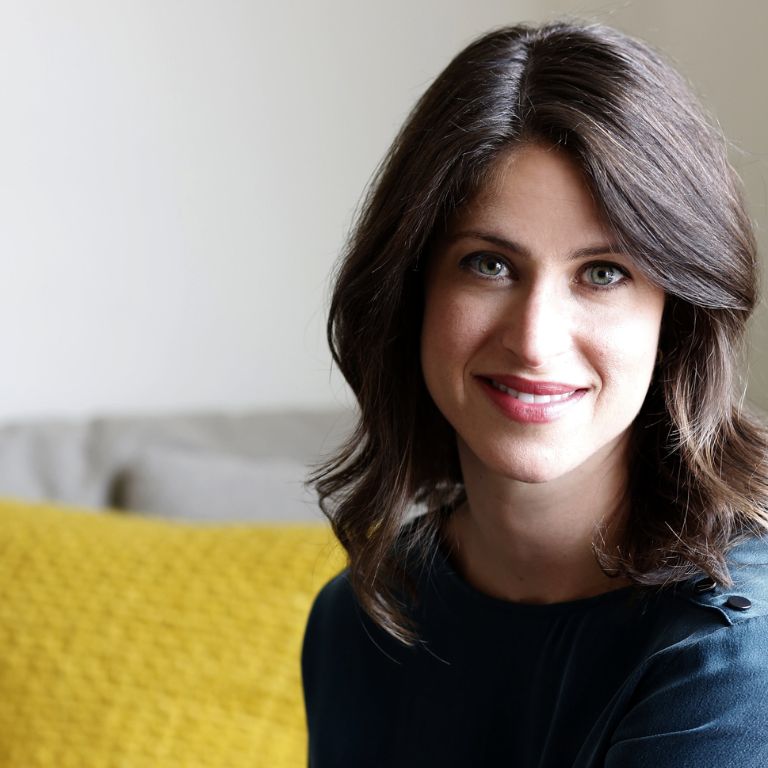What is matrescence? It's overwhelm in motherhood and here's why it's a hard relate
Matrescence might be a new word, but mums will recognise the description and feeling that go with it
Anna Mathur MBACP Accred

Matrescence might be a new word you’ve not heard of before, don’t worry you’re not alone, in fact you’d be forgiven for wondering if this was a typo as the word isn’t in mainstream conversation… yet.
During pregnancy and early motherhood, women undergo seismic psychological and physiological changes. Yep, yet this life-altering transition is neglected by society, women are expected to 'bounce back' after birth and 'work like they don't have children and mother like they don't work'. The expectations on mothers these days are unrealistic and unfair.
Editor's note
Understanding matrescence is taking time to adjust to your new role and be kind to yourself. But if you experience symptoms of postpartum depression or anxiety, seek help as soon as possible from your GP.
Anna Mathur, psychotherapist, author of Raising A Happier Mother: How to Find Balance, Feel Good and See Your Children Flourish as a Result, and mum-of-three tells us; “I sometimes wonder if society isn’t aware of matrescence because it’s easier that way. It’s easier, and cheaper perhaps, to assume that the transition into motherhood is black and white – you aren’t a mother, and then you are.”
Now the concept of matrescence, like adolescence, is opening up a whole host of new conversations about the challenges of modern motherhood, helping to create a new mothering culture. In this article we look at matrescence, what it is, what it means, and how it might feel for new mums, we talk to experts and other mums to get their experience.
Matrescence
"Simply put, matrescence is the process of becoming a mother." Anna tells us, "It’s the recognition that becoming a mother is an evolving and shifting of every mental, emotional, hormonal and social experience and identity. It’s a challenge of the belief that we become mothers the moment our baby emerges from the womb, or the moment the sperm meets the egg."
I'm Stephanie, Family Editor here at Goodto and I'm the first to admit that before I had my child at 35 years old I had little to no idea about what becoming a mother would actually do to me. I knew what it would do to my body, of course I did, society chats at length about mother's bodies and 'bouncing back', but everything else that goes with it, was a surprise, to say the least. Becoming a mother altered me, my self, my mind, my thought processes, my relationships, my career... in short it altered my everything - in a way I was not at all ready for. The weight of responsibility was almost too much to bear, I thought that I would still be the same person.

I'll be honest, life from a mother’s perspective - the work mother's do - had never really interested me before, real work happened in an office, after all, right? When in fact, motherhood has been the hardest, most enlivening and extreme psychological, existential, social, and physical 'work' of my entire life.
Parenting advice, hot topics, best buys and family finance tips delivered straight to your inbox.
A 2023 study from Science Direct found that the maternal brain undergoes significant structural and functional neuroplasticity - which means the ability of the nervous system to change its activity by reorganising its structure, functions, or connections after childbirth - as well as cognitive adaptations during the peripartum period, which are long-lasting and present throughout the lifespan. In other words, it changes the very core of us.
"Neuroscientists have found that the impact of pregnancy on the brain is as significant as the impact of adolescence"
Alexandra Sacks
"Matrescence is regularly misunderstood and confused with post natal depression." Dr Alexandra Saks, M.D. says in her TED talk. She goes on to add; "If women understood the natural progression of matrescence, if they knew that most people found it hard to live inside this push and pull, if they knew under these circumstance ambivalent was totally normal and nothing to be ashamed of - they would feel less alone and less stigmatised. And I believe it would reduce rates in post partum depression."
In a research paper she did for Psychology Today Dr Saks talks about her work on 'the developmental transition to motherhood' and explores “matrescence,” a term coined in 1973 by Dana Raphael, a medical anthropologist who also popularized the phrase “doula.”
What are the symptoms of matrescence?
While there are no 'formal symptoms' as such Dr Saks reports a pattern that she's observed. She writes; "Though [many women] may not meet diagnostic criteria for this postpartum depression [that term] seems to be the most familiar one they have to frame their distress. Here’s what many of them describe;
- “I love my baby but I don’t have the right maternal instincts.”
- “I’m not enjoying this, mostly I feel tired.”
- “I feel so guilty because I wanted a baby more than anything, but sometimes I find myself feeling bored and even resentful.”
"These descriptions of discomfort are natural to matrescence and not diagnostic of any specific disease." Dr Saks writes.
Mum-of-3 Emma thinks educating new mums about matrescence would perhaps make this new life stage a whole lot easier.
“If only there was an explanation that I could’ve referred to throughout new motherhood! An all-encompassing term that calmed the nerves and made it all feel less weird. This would’ve been everything,” she tells us.
“I think I always needed validation at those times of panic when I realised ‘loving my children is easy but I have no idea about the rest of it’. I almost wish I could do it all again from the start - knowing what I know now. Which is still nothing. Other than it’s OK to know nothing but to feel absolutely everything. And that it’s all part of a process, with a WORD and everything!”
It’s no coincidence that matrescence sounds like adolescence. Both are times when body morphing and hormone shifting lead to an upheaval in how a person feels emotionally, and how they fit into the world. Anna agrees, telling us; "When we recognise the huge shifts that happen in a woman as she moves towards motherhood, and navigates the early weeks, months and years, then we have to acknowledge the need for recognition and support through these shifts and changes."
Talking to Positive News, author of Matrescence: On the Metamorphosis of Pregnancy, Childbirth and Motherhood Lucy Jones says that after giving birth, she felt 'as if I had been rewired'. She goes on to say; "Many new mothers are lonely, anxious, depressed, burnt out and blame themselves for it. But the more I researched, the more I realised how impossible the institution of modern motherhood is today."
The more we talk about these things and the mixed and complex feelings we have, the better.
Suzie, mum of two
It's important to remember you're not alone, and it's okay to talk about what you're thinking and feeling. For Suzie, a mum of two, having a label for this period in her life has really helped her feel less alone.
“Adolescence, going from childhood to early adulthood, takes years to go through, and for me the process of becoming a mother has been a similarly long journey,” she tells GoodTo.
“My kids are 8 and 6 now and I think it's only recently that I've figured it out and love this new version of me! Nothing is the same after kids - your body, your work, your sleep, your brain, almost your every waking thought. And it's nice to have a label for it and know you're not alone. The more we talk about these things and the mixed and complex feelings we have, the better."

How long is matrescence?
No one really knows. Some say up to ten years after baby is born, others that it depends from person to person. According to Aurelie Athan, Matrescence advocate and clinical psychologist; "The exact length of matrescence is individual, recurs with each child, and may arguably last a lifetime."
Parenting writer, Jayne Cherrington-Cook, feels like she’s only just come out of her matrescence - and her son is 14. She tells us: "I felt like I lost myself when I became a mum. It was harder than anything else, and I thought I'd bounce back quickly. Learning that this phase can last for years is comforting. Becoming a mum in my late 30s, I'm now facing peri-menopause, but surprisingly, I feel more prepared for this transition than I did for motherhood!"
No matter the length, Anna tells us; "In recent years, we are shining a light on the hormonal shifts that happen through perimenopause and menopause. Women are advocating for themselves within society and the medical system, for this huge and often behind-the-scenes, taboo, to be recognised, acknowledged and accounted for.
And, as we call for matrescence to be recognised, we begin to acknowledge the need for more emotional, physical and practical support that might be needed in order for mothers to thrive."
How do I prepare for matrescence?
Be kind to yourself and don't be afraid to talk about what you're feeling or going through - with friends, other mums, your partner.
Anna tells us; "When we recognise that we aren’t alone in some of the emotions and challenges we face in motherhood, it powerfully chips away at shame and taboo, paving the way for more honesty and vulnerability. Honesty strengthens community, and when people don’t feel alone, they’re more likely to seek and accept support."
Suzanne Holt worked with a coach when she found herself dealing with matresence. The experience led her to set up her own business, INSIDE Coaching.
“After I had my son, I got lost!” she tells us. “Not in the first year, the really tough year of sleepless nights, but in the years following my return to work! That lost feeling crept up on me slowly. It felt like I didn’t fit in situations where I’d felt effortless before. It felt like being a square peg in a round hole. It felt like everything was harder - making decisions at work, making plans to see friends, making time for myself, finding the time and energy for things I used to enjoy! Slowly all of the pieces that I built my identity on fell away and I felt lost, alone and very vulnerable.”
She continues: “Working with a coach and discovering matrescence helped me to connect with this brand-new version of me. Now, as a leadership coach for mums in construction, I use matrescence as part my training programmes."
Going through matrescence is like going through adolescence according to research from Science Direct, with this in mind Anna says that it would be transformative for each mother to be given insight into what to expect through matrescence; "We expect those going through puberty and menopause to experience challenged emotions and resources, yet the expectation tends to be that new mother’s should feel happy and grateful despite the fact that they’re also going through huge hormonal shifts."
She goes on to add; "When we normalise very common experiences (e.g experiences of emotional flux, exhaustion, overwhelm, impact of tiredness etc.), we can more easily talk about it and access support. Yet what often happens when something isn’t widely understood, is that they get pathologised and medically labelled, giving the impression that something is ‘wrong’, when truly the mother is having a very normal response to their vastly changed circumstances."
Matrescence - the best podcasts to listen to
- The Matrescence Podcast: Hour long podcasts with Australian hosts Kelly Wilkes and Bree Holling sharing evidence-based information with personal insight to help you make informed and empowered decisions, grow as individuals and mothers and find solidarity in this journey that is matrescence. The episodes are a joy to listen to.
- The Motherkind Podcast - Matrescence: the word we all need with Lucy Jones: This 40-minute episode is a great listen with Lucy Jones. She is an investigative journalist, award-winning author and has just written a new book called Matrescence.
- Overwhelm in motherhood & matrescence: Sarah is a Motherhood Occupational Therapist and provides incredible sensory, motherhood support and matrescence education!

Alexandra Sacks, MD is a psychiatrist affiliated with the Columbia University Psychoanalytic Center for Training and Research, where she is an Associate Instructor and Co-Chair of Recruitment.
The early years of motherhood can feel the hardest, remember you're not alone if you hate playing with your kid, struggle with toy rotation or if you don't want mum friends.... you do you. And know that no matter your choices or style, we promise you're not alone in it.
Stephanie has been a journalist since 2008, she is a true dynamo in the world of women's lifestyle and family content. From child development and psychology to delicious recipes, interior inspiration, and fun-packed kids' activities, she covers it all with flair. Whether it's the emotional journey of matrescence, the mental juggling act of being the default parent, or breaking the cycle of parenting patterns, Stephanie knows it inside out backed by her studies in child psychology. Stephanie lives in Kent with her husband and son, Ted. Just keeping on top of school emails/fundraisers/non-uniform days/packed lunches is her second full-time job.
- Anna Mathur MBACP AccredMother, Pyschotherapist and author